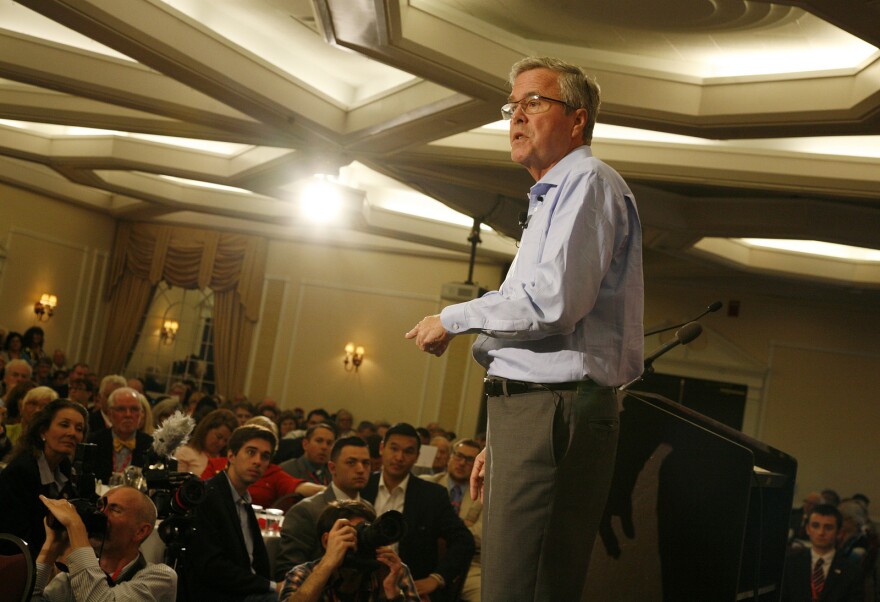All week long, we've has been looking at how disparities in early childhood can shape a child’s chances for later in life.
Issues surrounding what some call the opportunity gap and others call inequality of opportunity, are common concerns of politicians in both parties these days, starting at the very top.
Here's President Obama on this very issue:
“Disparities in education, mental health, obesity, absent fathers, isolation from church, isolation form community groups -- these gaps are now as much about growing up rich or poor are they are about anything else.”
Senior Political Reporter Josh Rogers joined Morning Edition to discuss how the men and women fighting to become the next occupant of the White House are talking about these issues.
Everybody loves kids, but consensus isn’t a snap on these issues. Both parties have core ideological beliefs, and they tend to stick to them.
That’s true. Democrats see a larger role for government, and government spending -- investment they tend to call it. Republicans, meanwhile, mostly steer the discussion towards personal responsibility, and focusing on individuals might be empowered empower individuals to make decisions. That’s the broad picture.
Are we hearing anything specific from candidates on these issues?
Most of the talk is general – but we are hearing some. For Democrats, it's definitely part and parcel of reshuffling the deck, to borrow a phrase from Hillary Clinton. But we are hearing some detail. When Clinton campaigned in Keene last month – she was visiting a children’s furniture maker – she spoke of the need for early education and day care.

“We’ve got to do more to support, quality child-care and universal pre-kindergarten, because by the time a child enter kindergarten a lot their brain development....their vocabulary has been developed. Because if we want to do well in school. It has to start in those first 5 years.”
Now Clinton didn’t spell out how that might work, but did point to how Oklahoma – a state dominated by Republicans – has embraced early education, to suggest that it’s an issue where parties might be able to reach common ground. The only other Democrat now in the race, Sen. Bernie Sanders of Vermont, meanwhile has spoken broadly and more pointedly about what he sees not simply a matter of policy, but one of morality.
“We can’t continue having a nation in which we have the highest rate of child poverty of any major nation on earth, and at the same time a proliferation of millionaires and billionaires.”
Now I know college education isn’t the first decade, but I understand Sanders is backing a bill to pay for universal college by taxing trades and stocks bonds and derivatives.
Yes. In a GOP-controlled congress, this isn’t going anywhere, but it is a very specific proposal.
What about Republicans? How are they framing these issues?
Well, for most of them this is about getting government, as they often put it, out of the way. But some candidates say issues surrounding inequality of opportunity are near the center of their concerns. Here’s Jeb Bush for instance, campaigning last month in Concord.
“I think social mobility is the great challenge of our time. You could take all the money from all the rich people and it’s not going to necessarily have an impact on the person born into poverty to rise up.”

So two points there: A statement that climbing the economic ladder is harder today than it once was, and the suggestion that even massive redistribution of income won’t fix this.
Yes. Bush went on to say the country needs to do a better job making sure people have the skills to move up the economic ladder, through what he tends to call “earned success.” He says giving parents more choice in education through tax credits and the like can help on this. Nothing hugely specific, but if you hear Bush talk, you get the sense he believes fostering greater opportunity for all is a multi-faceted issue.
But no so with all Republicans in the race?
No, Ted Cruz, for instance says these issues aren’t quite basic. He often calls himself a practitioner of “opportunity conservatism,” wherein broad economic growth lifts all – including those at the bottom
“It’s not complicated. We’ve seen over and over again that when the federal government pursues tax reform and regulatory reform. When we reduce the burdens of taxes and simplify the tax code, and when we reduce the federal regulatory burdens that are strangling small businesses – over and over again tremendous growth results”.
Now, Cruz has proposed single tax rate and getting rid of the IRS. Florida Senator Marco Rubio would also drop rates and brackets, and all taxation on investment income, but it also ups the child tax credit to $2,500.
Yes, Rubio’s plan is interesting --some conservatives love it, others don’t, saying it leaves top rates too high. And in some way it’s emblematic of challenges for Republicans face on these issues: How to cut taxes to appeal to core GOP constituencies, and also come up with conservative policies that might reach beyond core GOP voters. For Rubio -- all policy aside -- tying a tax reform to children probably isn’t the bad politics.









